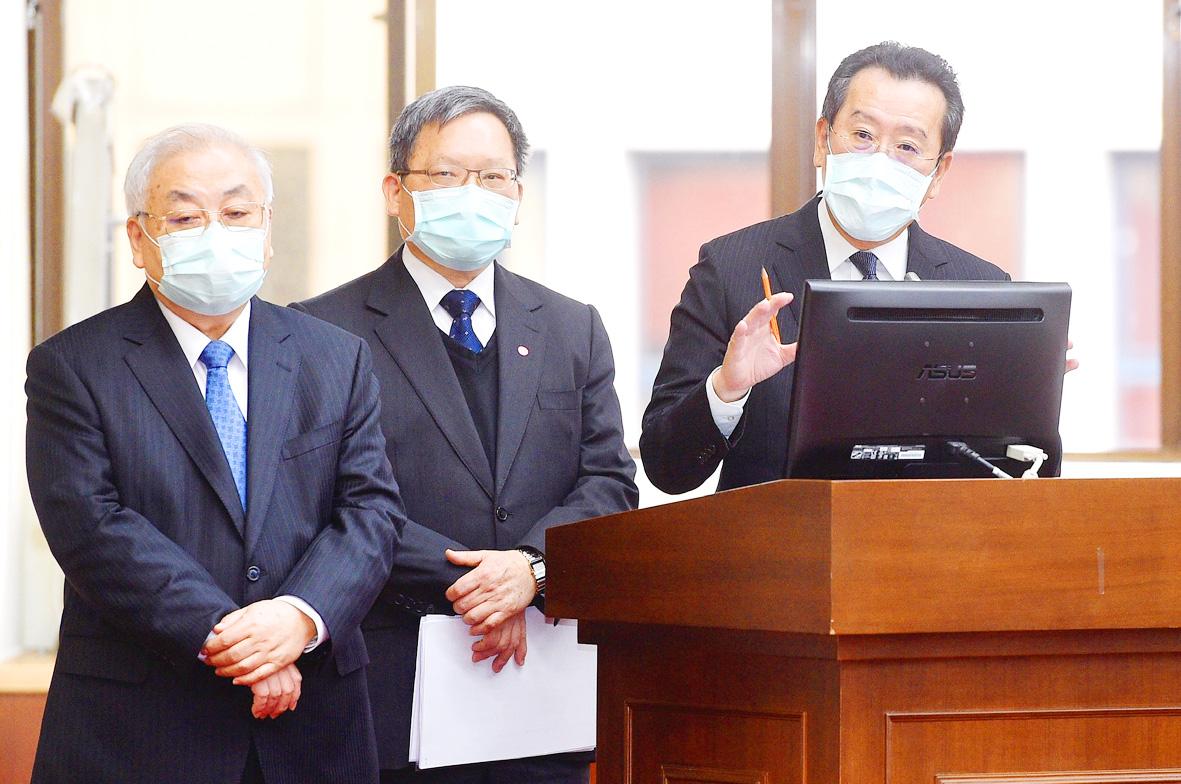Local banks had approved 5,056 loan applications totaling NT$81.6 billion (US$2.72 billion) for businesses affected by the COVID-19 pandemic as of Wednesday last week, surging from 510 applications totaling NT$7.39 billion two weeks earlier, Financial Supervisory Commission (FSC) data showed yesterday.
Eighty-seven percent of the loans, or 4,177 applications for NT$71.7 billion, were provided by state-run banks, for an average of NT$17 million per application, the data showed.
Private banks lent NT$9.9 billion to 879 firms, for an average of NT$11 million per application, data showed.

Photo: George Tsorng, Taipei Times
“It seems that the government did not have a strong incentive to encourage private banks to help affected businesses,” Chinese Nationalist Party (KMT) Legislator William Tseng (曾銘宗) told a meeting of the legislature’s Finance Committee in Taipei.
The approved loans represented a tiny fraction of the nation’s total lending of NT$6.9 trillion to small and medium-sized enterprises (SMEs), Tseng said.
The lending does not appear significant, as the government’s relief program aims to support SMEs, commission Chairman Wellington Koo (顧立雄) said.
The commission would review its incentives for private banks to approve more loans for businesses affected by the pandemic, Koo said, adding that the government would cover most risks.
The Small and Medium Enterprise Credit Guarantee Fund of Taiwan offers credit guarantees of 80 to 90 percent, or even full guarantees, for small-scale firms, he said.
Separately, the FSC would not lift a ban on short selling on the Taiwan Stock Exchange and the Taipei Exchange, even though the local equity market has recovered, Koo said.
The commission first needs to evaluate whether the pandemic has been brought under control in Europe and the US, as the local market is highly sensitive to foreign equity markets, he said.
The regulator announced the ban in the middle of last month to curb speculative trading amid “irrational declines” on the stock market.

TAKING STOCK: A Taiwanese cookware firm in Vietnam urged customers to assess inventory or place orders early so shipments can reach the US while tariffs are paused Taiwanese businesses in Vietnam are exploring alternatives after the White House imposed a 46 percent import duty on Vietnamese goods, following US President Donald Trump’s announcement of “reciprocal” tariffs on the US’ trading partners. Lo Shih-liang (羅世良), chairman of Brico Industry Co (裕茂工業), a Taiwanese company that manufactures cast iron cookware and stove components in Vietnam, said that more than 40 percent of his business was tied to the US market, describing the constant US policy shifts as an emotional roller coaster. “I work during the day and stay up all night watching the news. I’ve been following US news until 3am

UNCERTAINTY: Innolux activated a stringent supply chain management mechanism, as it did during the COVID-19 pandemic, to ensure optimal inventory levels for customers Flat-panel display makers AUO Corp (友達) and Innolux Corp (群創) yesterday said that about 12 to 20 percent of their display business is at risk of potential US tariffs and that they would relocate production or shipment destinations to mitigate the levies’ effects. US tariffs would have a direct impact of US$200 million on AUO’s revenue, company chairman Paul Peng (彭雙浪) told reporters on the sidelines of the Touch Taiwan trade show in Taipei yesterday. That would make up about 12 percent of the company’s overall revenue. To cope with the tariff uncertainty, AUO plans to allocate its production to manufacturing facilities in

Six years ago, LVMH’s billionaire CEO Bernard Arnault and US President Donald Trump cut the blue ribbon on a factory in rural Texas that would make designer handbags for Louis Vuitton, one of the world’s best-known luxury brands. However, since the high-profile opening, the factory has faced a host of problems limiting production, 11 former Louis Vuitton employees said. The site has consistently ranked among the worst-performing for Louis Vuitton globally, “significantly” underperforming other facilities, said three former Louis Vuitton workers and a senior industry source, who cited internal rankings shared with staff. The plant’s problems — which have not

COLLABORATION: Given Taiwan’s key position in global supply chains, the US firm is discussing strategies with local partners and clients to deal with global uncertainties Advanced Micro Devices Inc (AMD) yesterday said it is meeting with local ecosystem partners, including Taiwan Semiconductor Manufacturing Co (TSMC, 台積電), to discuss strategies, including long-term manufacturing, to navigate uncertainties such as US tariffs, as Taiwan occupies an important position in global supply chains. AMD chief executive officer Lisa Su (蘇姿丰) told reporters that Taiwan is an important part of the chip designer’s ecosystem and she is discussing with partners and customers in Taiwan to forge strong collaborations on different areas during this critical period. AMD has just become the first artificial-intelligence (AI) server chip customer of TSMC to utilize its advanced